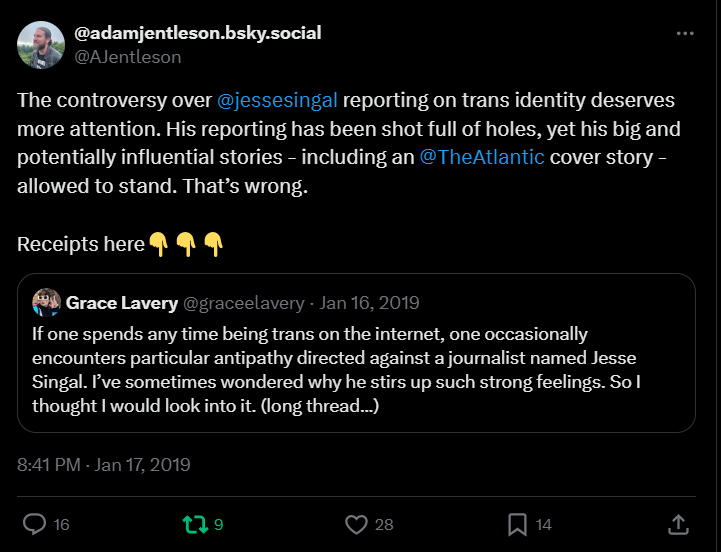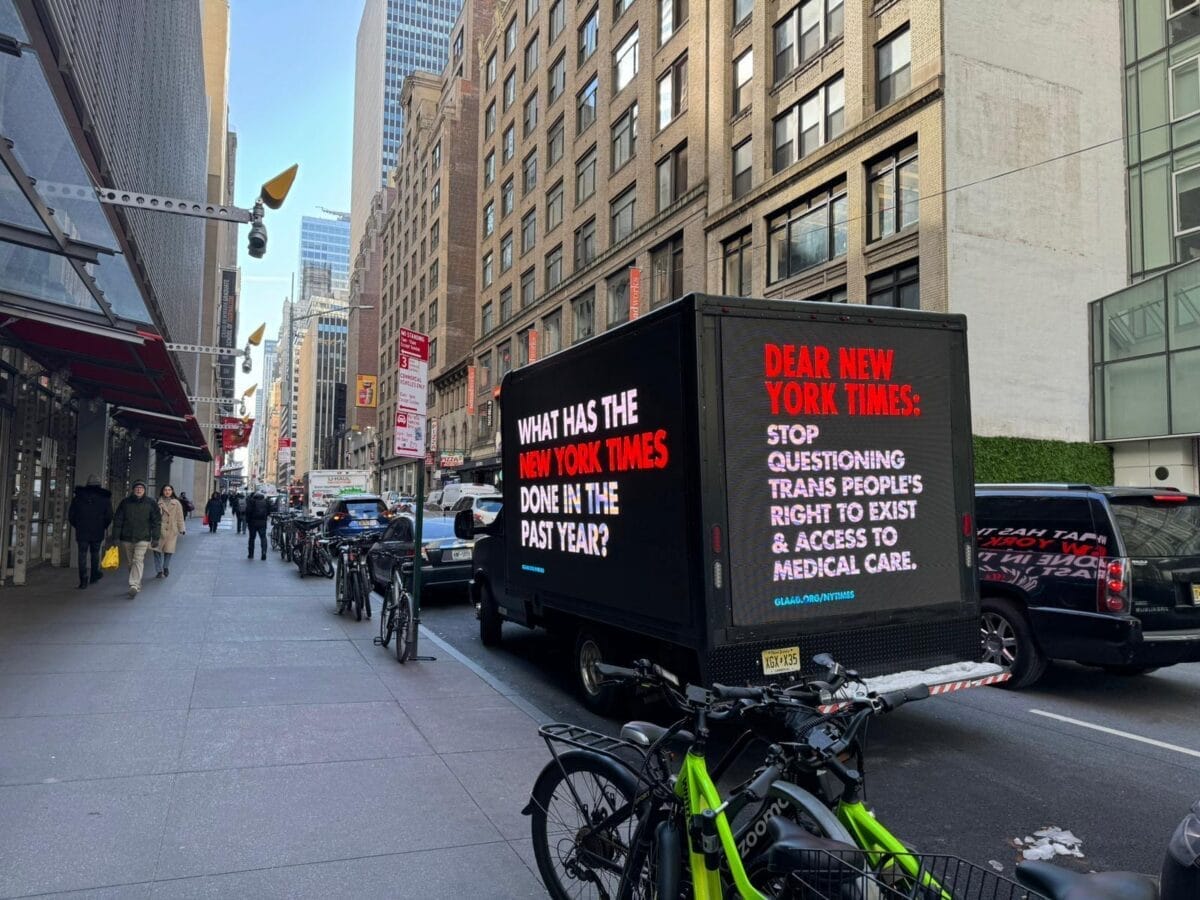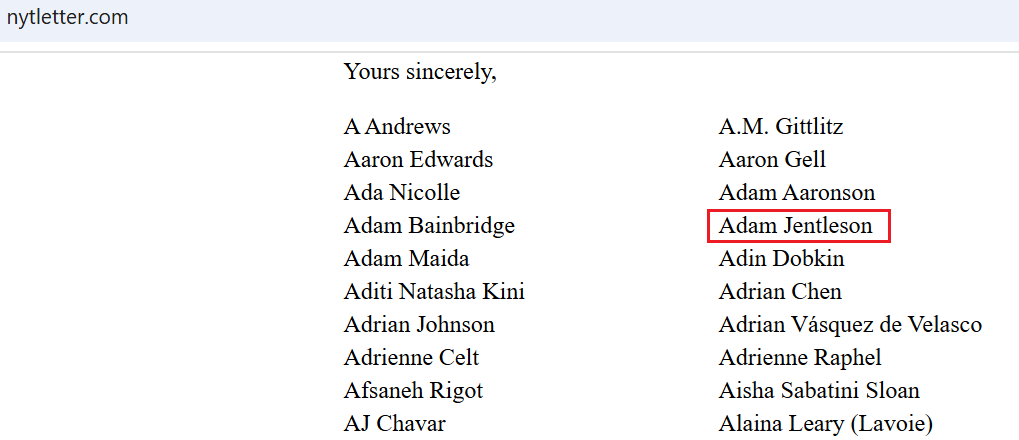I Highly Recommend Adam Jentleson’s Critique Of Adam Jentleson
A Spiderman Meme Dot Gif situation if I’ve ever seen one
Writing in a New York Times column headlined “When Will Democrats Learn to Say No?” that was published yesterday, Adam Jentleson explains that the Democrats need to respond to their recent setbacks “by building a supermajority of their own.”
If anyone is well-positioned to have solid insights into how the Dems can pull this off, it’s Jentleson, a well-regarded politico and writer who was a senior staffer for Harry Reid and John Fetterman.
A Democratic comeback, he argues,
starts with picking an ambitious electoral goal — say, the 365 electoral votes Barack Obama won in 2008 — and thinking clearly about what Democrats need to do to achieve it.
Democrats cannot do this as long as they remain crippled by a fetish for putting coalition management over a real desire for power. Whereas Mr. Trump has crafted an image as a different kind of Republican by routinely making claims that break with the party line on issues ranging from protecting Social Security and Medicare to mandating insurance coverage of in vitro fertilization, Democrats remain stuck trying to please all of their interest groups while watching voters of all races desert them over the very stances that these groups impose on the party.
Achieving a supermajority means declaring independence from liberal and progressive interest groups that prevent Democrats from thinking clearly about how to win. Collectively, these groups impose the rigid mores and vocabulary of college-educated elites, placing a hard ceiling on Democrats’ appeal and fatally wounding them in the places they need to win not just to take back the White House, but to have a prayer in the Senate.
Interest groups tend to be nonprofit organizations dedicated to advancing a single issue or set of related issues that they often hope to get on the Democrats’ agenda. At their best, these groups can be productive partners in building power and legislating. But many have grown too big, adopted overly expansive mandates and become disastrously cavalier about the basic realities of American politics in ways that end up undermining their own goals.
To cite a few examples, when Kamala Harris was running for the Democratic nomination in 2019, the A.C.L.U. pushed her to articulate a position on surgeries for transgender prisoners, needlessly elevating an obscure issue into the public debate as a purity test, despite the fact that current law already gave prisoners access to gender-affirming care. This became a major line of attack for Mr. Trump in the closing weeks of this year’s election. Now, with the G.O.P.’s ascent to dominance, transgender Americans are unquestionably going to be worse off.
After mentioning border issues as another area in which Democrats refused to say no to progressive interest groups, Jentleson explains that
Groups have become too accustomed to enjoying access without holding themselves accountable; the question “is this tactic more likely to trigger backlash than to advance our goals?” is the single most important one, yet it seems to be rarely asked by many of the groups’ leaders or funders. Meanwhile, many of today’s lawmakers and leaders have come up at a time when alienating the groups is seen as anathema, but they should start seeing it as both right and necessary — a long overdue resetting of the relationship that will be healthy for all involved.
I agreed with most of Jentleson’s column, and I liked the way he offered specific examples of how Democrats can move in a more supermajority-friendly direction, and specific politicians whom he believes are pulling off this sort of messaging effectively.
But his column also really pissed me off, because Jentleson himself eagerly participated in exactly the corrosive dynamics he describes!
To be fair, I’m writing in part from a place of personal pique. Back when it was extremely important for progressives to take a maximalist public stand on anything having to do with trans rights, Jentleson publicly lamented the fact that my stories on youth gender medicine had been “allowed to stand,” calling out my 2018 Atlantic piece in particular. (I had met Jentleson once or twice when we overlapped at the Center for American Progress about a lifetime ago, so after I saw this tweet I emailed him to ask whether he was really suggesting my work be retracted. “I don’t have a specific remedy in mind,” he wrote. The rest of our email conversation was not particularly productive or enlightening; I’ll refrain from sharing it, but he’s welcome to if he likes.)
Okay, maybe I’m being petty — that was almost six years ago! People can change.
But wait — there’s more. In early 2023, a group of New York Times contributors published an open letter denouncing the Times for its supposed transphobia, focusing specifically on youth transition issues. The organizers of the letter coordinated with GLAAD to release it the same day the activist group released its own letter on the same subject, signed by a group that included celebrities like Cynthia Nixon and Jonathan Van Ness. The group also parked a truck outside the Times building to draw more attention to the threat the Gray Lady ostensibly posed to transgender Americans.
The NYT contributor letter denounced Times journalists like Katie Baker, Azeen Ghorayshi, and Emily Bazelon by name, condemning their coverage as transphobic and ignorant. If you read their work and then read the open letter, you will be shocked at the chasm between what was actually published by the Times and how that work was misrepresented by the NYT contributors’ letter. Fundamentally, Baker, Ghorayshi, and Bazelon were subjected to this shitstorm not because they had committed any noteworthy journalistic errors, but because they hadn’t written about youth gender in the tightly circumscribed and often scientifically inaccurate manner demanded by groups like GLAAD.
Less than two years later, Ghorayshi and Bazelon’s decision to treat youth gender transition as a genuine controversy warranting mainstream coverage has been completely vindicated by numerous damning revelations about youth gender medicine research and advocacy, and by the Cass Review’s conclusion that we have effectively no quality research on whether or not these treatments are worth the potential risks. (I don’t mean to exclude Baker, but her article was on the somewhat more subjective question of school policy on disclosing students’ gender-questioning to their parents, so by nature it’s not a subject on which she could be “vindicated” in the same way.)
If these journalists had committed noteworthy errors, surely the Open Letter authors would have been able to list them. But as I — and, more importantly, Erik Wemple — later pointed out, the letter contained a number of plainly false or deeply misleading accusations, including some that, in my opinion, are so straightforwardly and objectively false that they can be accurately described only as lies. Wemple and I both reached out to the organizers to ask about their claims, but the organizers have neither responded substantively nor corrected anything in the letter. As far as I know, none of the signatories have removed their names, despite the false and misleading claims they must now know they are endorsing.
And — surely you see where this is headed — Adam Jentleson is one of those signatories:
So Jentleson signs a letter lying about journalists because they didn’t follow the dictates of groups like GLAAD — a letter released in coordination with GLAAD — and then less than two years later he takes to the pages of The New York Times to lament the influence of interest groups on Democratic politics! I know that Washington, D.C. is chock-full of people who act like snakes and that this sort of behavior is not unusual down there, but this is still quite frustrating —it’s the height of smarmy disingenuousness.
Jentleson’s quiet about-face reminds me of what happened to my friend Helen Lewis. Back when the UK was debating a legal reform that would have instituted a maximalist approach to self-ID — to oversimplify slightly, changing one’s sex legally wouldn’t have required much more than announcing oneself as a man or a woman — Lewis authored some eminently reasonable commentary about the potential conflicts inherent to a self-ID regime. She was absolutely shellacked for it — her voice was removed from a video game as retribution! — as were other feminists who made arguments that were perfectly reasonable. A truly stifling atmosphere of vindictive censoriousness descended on the British left when it came to these questions, and some women were driven out of the Labour Party for expressing milquetoast views on sex and gender that are shared by majorities (and in some cases overwhelming majorities) of the British public.
This was never going to last, because the underlying policy proposals, once they were explained to the public, simply came across as too radical. The self-ID reform collapsed under the weight of public backlash, and Labour softened its stance on trans issues in general.
As Lewis wrote in late 2022:
I confidently predict Labour will go into the next election with a platform you might call “Helen Lewis’s Extremely Mild, Yet Bizarrely Controversial Views”: trans acceptance should be championed, but there should be exceptions for female single-sex spaces and sports, plus let’s be very reluctant to medicalise children, hey? But there will be no acknowledgement of the pivot, and no attempt to explain the evidence which led to it.
Of course I find this frustrating: many principled feminist campaigners have immolated themselves on this bonfire, and Starmer will get to warm himself on the flames, without having to use his own political capital as kindling.
This is exactly what happened, as Lewis would later write in The Atlantic: Labour adopted a liberal but normie stance on sex and gender, including the belief that sex and gender identity are, in fact, truly distinct things, and a bunch of people had to start pretending they hadn’t been part of a bizarre yearslong defenestration campaign.
It looks like we’re approaching that point in the United States. Kamala Harris surely didn’t lose because of her and Joe Biden’s stance on trans issues — in most cases, whatever GLAAD wants — but at this point it’s obvious that those stances were problematic, from a campaigning and public-opinion perspective. So problematic, in fact, that Harris effectively stopped talking about trans issues at all, leaving her campaign in a strange purgatory where Republicans could attack her over her past stances (as Jentleson pointed out), but in which she also wouldn’t assertively defend that stance or modify her position. It was a truly disastrous issue for her and her campaign.
And when even the Adams Jentleson of the world are pointing this out, moderation is inevitable. But I strongly suspect that as liberal but moderate policies on certain trans issues become the mainstream Democratic position, a lot of people are going to do what Jentleson did in this column. That is, they will tut disapprovingly at how heated and intense things got, at how frustrated they are that some people (no way to know who, exactly) ignored “the basic realities of American politics,” all while conveniently leaving out the fact that they themselves were thrilled to be on the front lines of an exciting-seeming social justice movement when the political winds were blowing in a different direction.
Questions? Comments? Opinions you want to pretend you never held? I’m at singalminded@gmail.com or on Twitter at @jessesingal. Image: UNITED STATES - DECEMBER 15: Adam Jentleson, center, appears with his boss Senate Minority Leader Harry Reid, D-Nev., right, and artist Michael Heizer, before an easement signing ceremony in the Capitol to help protect Nevada’s Basin and Range National Monument that contains Heizer’s modern art sculpture “City,” December 15, 2016. (Photo By Tom Williams/CQ Roll Call)






I will say this in the comment's section. When I came out as trans, I had a convert's zeal, probably related to my Christian background. I was the kind of person who would trash someone online for an opinion, and in all honesty, I'm still that way. I can remember in my early twenties reading authors like Julia Serano, or Jennifer Finney Boylan and bumping up against this idea that trans women might not literally be female, because gender is fluid, and feeling threatened and insecure, and deciding I liked the certainty of "trans women are women" and turning this into the trappings of my online ideology, basically my excuse to yell and be rude to people who disagreed with me. The feelings of being threatened and insecure of course didn't go away, no matter how ingrained in online politics I became, or how righteous I thought my activism was. Aging from my twenties to my thirties, and getting more educated, I now see the original point those trans authors made about avoiding literal definitions. Most people really do have to learn the hard way.
LOL at him citing Grace Lavery. I'm surprised that Lavery didn't get laughed off of the internet for claiming that the UC Berkeley English department was a "transphobic hellhole".
https://x.com/graceelavery/status/1780072233328607294